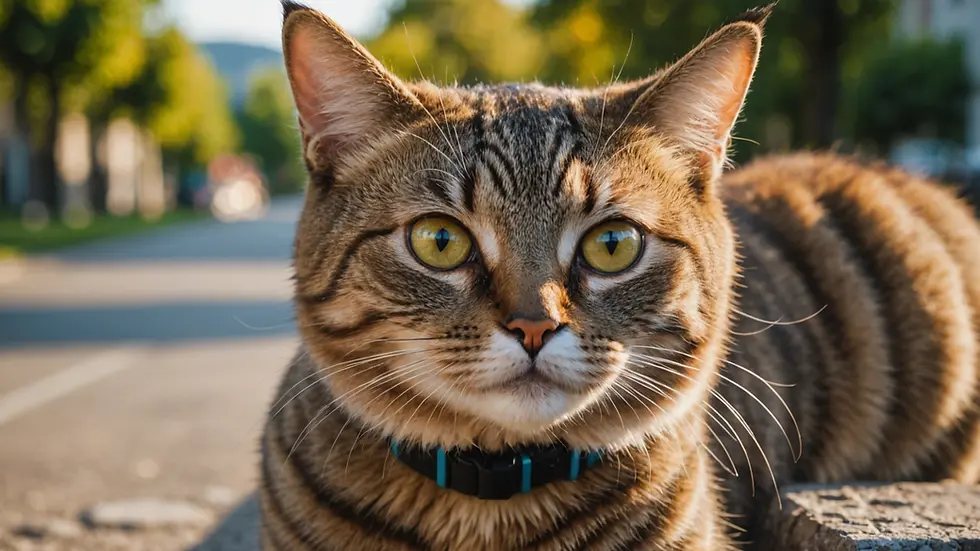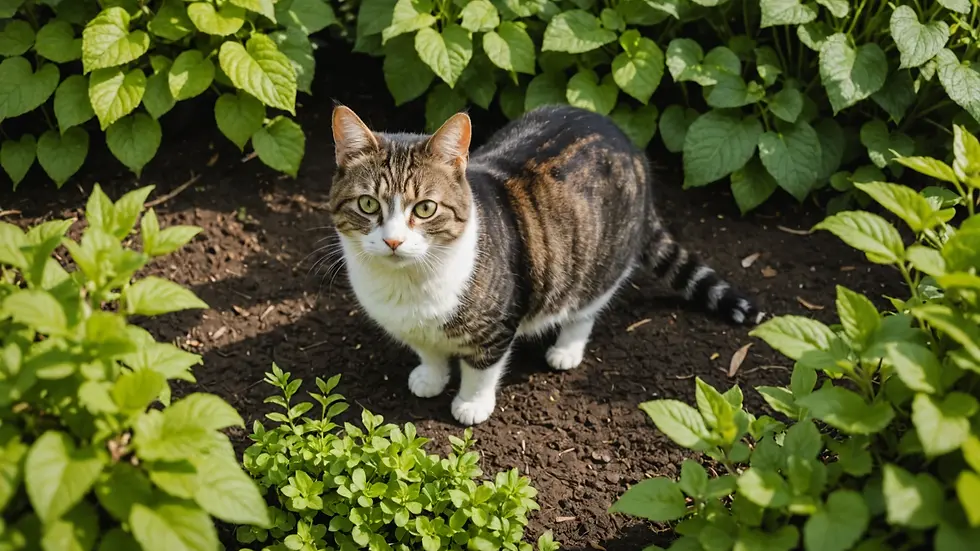Are Cat Tracking Devices the Ultimate Solution for Keeping Tabs on Your Feline Friend?
- Jyotiraj Borah
- Feb 12
- 5 min read
Keeping track of your beloved feline can sometimes feel overwhelming, especially if your cat loves to roam. Modern cat tracking devices provide pet owners with the tools to monitor their cats’ whereabouts and activities. From cozy days indoors to thrilling outdoor adventures, these devices offer peace of mind and insights into your cat's daily life.
In this post, we will look at the types of cat tracking devices available, how they operate, their benefits, and what to consider when selecting a device for your furry friend.
Understanding Cat Tracking Devices
Cat tracking devices help owners pinpoint their pets' locations and monitor their movements. They come in various formats, including GPS collars, activity monitors, and microchips. Each type offers unique features and benefits tailored to different lifestyles and needs.
GPS Collars
Arguably the most popular choice, GPS collars use satellite technology to give real-time location data. Many models include features like:
Live Location Tracking: See your cat’s exact location on a mobile app, providing you with updates every few seconds. For example, some devices can track your cat's movements within a 1-meter radius.
Geofencing Alerts: Receive immediate notifications if your cat ventures outside a designated safe zone, helping you prevent accidents. A study found that 15% of lost cats are found within a mile of their home.
Activity Monitoring: Track how far your cat travels and their activity levels throughout the day. Some devices show exercise metrics, such as specific times of day your cat is most active.
Keep in mind that GPS collars typically require a subscription for ongoing tracking services, impacting your budget.

Activity Monitors
In addition to tracking location, activity monitors provide deeper insights into your cat's health and behavior. These attach to your cat’s collar and collect data on their activity levels and sleep patterns. Key features include:
Health Monitoring: Monitor daily exercise and ensure your cat is getting enough physical activity, with recommendations based on their size and breed. For example, a cat may need at least 30 minutes of playtime each day to maintain a healthy weight.
Behavioral Insights: Learn about your cat’s sleep habits and behavioral trends, which can alert you to any concerning changes in behavior.
Connectivity: Many activity monitors sync with mobile apps for easy tracking and evaluation, allowing you to set goals for your cat's exercise.
These monitors can be especially useful for pet owners concerned about health issues, like obesity — a condition that affects nearly 60% of cats in the US.

Microchips
Microchipping is a reliable and permanent solution for pet identification. A microchip is a tiny device implanted under your cat's skin, containing a unique identification number linked to a registry. Consider these important facts about microchips:
Permanent Identification: If your cat gets lost, a microchip can help identify them if found. Statistics show that nearly 90% of lost pets reunited with their owners are microchipped.
No Subscription Fees: Unlike GPS collars, microchips are a one-time expense with no ongoing costs.
Limited Tracking: Microchips do not offer real-time location tracking; they are used mainly for identification when scanned at a vet or shelter.
Microchipping is a vital form of identification, but it should complement other tracking devices for complete safety.
Benefits of Cat Tracking Devices
Investing in a cat tracking device can provide several advantages for both you and your feline friend:
Peace of Mind
The top benefit is the reassurance that comes from knowing where your cat is at all times. This peace of mind allows you to enjoy your time with them, whether they are indoors or outside, without worrying about their safety.
Safety and Security
Features like geofencing and location alerts enhance your cat's safety. Knowing if your pet wanders too far can help you prevent potential dangers, which include traffic or interactions with other animals. For instance, a device could prevent a cat from wandering into a busy street.
Health Monitoring
Activity monitors offer essential insights into your cat's wellness. Monitoring their activity levels can help prevent obesity and identify any potential health concerns early. Regular monitoring can lead to better diet and exercise adjustments.
Enhanced Bonding
Tracking your cat's habits provides an opportunity to strengthen your bond. Understanding where they like to spend time or what they enjoy can help you create a more enriching environment that caters to their needs.
Choosing the Right Cat Tracking Device
Selecting the best tracking device for your cat involves careful consideration. Here’s what to keep in mind:
Lifestyle Considerations
Consider your cat’s daily habits and environment. A GPS collar may be ideal for outdoor adventurers, while an activity monitor or microchip may suffice for indoor cats.
Budget
Costs vary greatly among tracking devices. GPS collars may require monthly subscriptions, while microchips entail just one upfront cost. Determine what fits your budget and gives you the protection you want.
Size and Weight
Ensure the device is appropriate for your cat's size. Some collars or monitors may be too bulky for smaller breeds, potentially causing discomfort. Always put your cat's comfort first.
Durability and Water Resistance
Cats can be tough on their gear. Opt for devices that are durable and, if possible, water-resistant, especially if your cat enjoys outdoor play.
Common Misconceptions About Cat Tracking Devices
As with any technology, misconceptions can cause confusion. Here are a few common myths about cat tracking devices:
“My Cat Won’t Wear a Collar”
Many owners fear their cats will resist wearing a collar. However, with a slow introduction and positive reinforcement, most cats can adapt well to wearing a collar or tracker over time.
“GPS Collars are Too Expensive to Maintain”
While GPS collars often come with a subscription fee, the safety and peace of mind they offer can be worth the investment. Assess how much you are willing to spend on your pet's safety.
“Microchips Act as GPS Trackers”
Microchips are often confused with GPS devices. They serve to identify your pet but do not provide real-time tracking. Always rely on GPS or activity monitors for accurate tracking needs.
Tips for Effectively Using Cat Tracking Devices
After selecting the right device, follow these tips to maximize its benefits:
Regularly Check the Device
Confirm that the device functions correctly and its battery is fully charged (if applicable). A malfunctioning device leaves you unprotected during critical moments.
Update Your Information
Keep your contact information current in the registry linked to your cat's microchip. This ensures that someone can reach you quickly if your pet is found.
Get Your Cat Used to the Device Gradually
If your cat is new to wearing a collar or tracking device, introduce it slowly. Let them explore it and wear it briefly before gradually extending the time.
Combine Technologies
For the best safety, consider using both a GPS collar and a microchip. Each serves a different purpose and work together to ensure your pet's safety and identification.
Final Thoughts
Cat tracking devices present a smart approach to monitoring your feline friend and understanding their daily adventures. From GPS collars to activity monitors and microchips, you can select options that meet your pet's needs and ensure peace of mind for you.
By recognizing the benefits, debunking myths, and carefully choosing the right device, you can provide a safer and more connected experience for both you and your furry companion. As technology continues to progress, embracing these tools will improve your understanding of your cat's behavior and needs.
In today's hectic world, cat tracking devices may truly be a vital solution for keeping tabs on your cherished pet—every cat deserves safety and every owner deserves peace of mind.





Commentaires